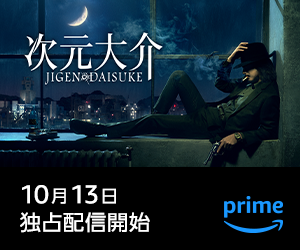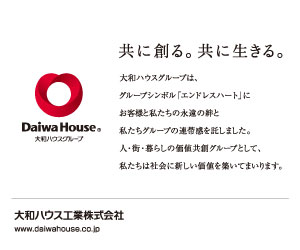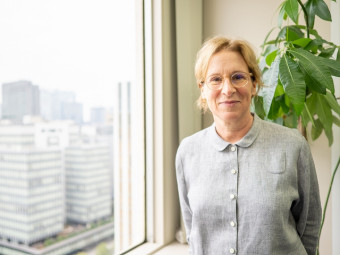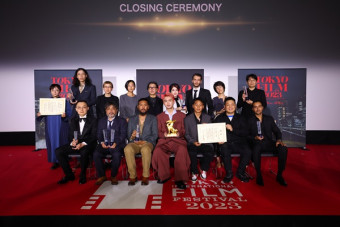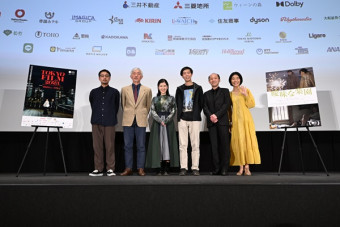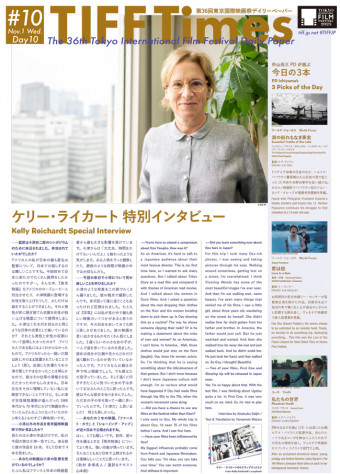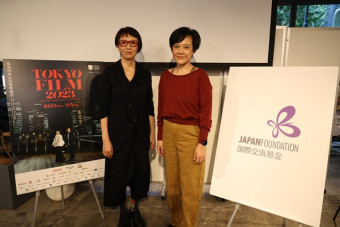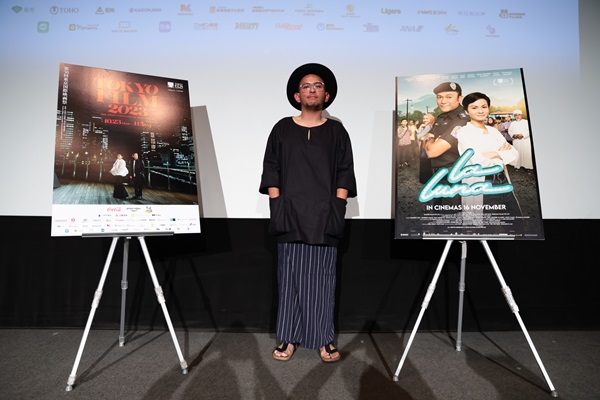
The Singapore-Malaysia production La Luna, directed by M. Raihan Halim, received its world premiere in the Asian Future section of the 36th Tokyo International Film Festival on October 24. Joining Senior Programmer Ishizaka Kenji for a Q&A session following the screening, Halim admitted, “It’s been my dream to come to Japan because I love the Japanese girl group Speed. To be able to come and present my film is really a dream come true.”
Moving right into a discussion of the film, Ishizaka said he’d heard the director had been inspired by a true story. “Yes, that’s right,” said Halim. “I read some 15 years ago about a lingerie shop that had been burned down, and I wondered why in the world someone would want to burn down a lingerie shop.”
From such tiny seeds can come inventively vibrant stories. In the film, Hanie (Sharifah Amani, star of many Yasmin Ahmad films), a headstrong woman from the big city, opens a lingerie shop called La Luna on her late grandfather’s property in the sleepy Muslim village of Bras Basah, Malaysia. This upends the area’s age-old traditions and begins empowering the female residents almost overnight.
The pious and ultraconservative village chief is determined to shut the shop down, and rallies the menfolk to his cause — often using veiled threats. But the men are enjoying their new lives, helped by the sexy new boutique. And besides, the women won’t hear of it, now that they have the newfound courage to stand up to repression and in some cases, even abuse. Hanie and her liberating influence are essential to the community for a variety of reasons, and yet… and yet…
Halim was asked about the scene (spoiler alert!) in which tradition-minded villagers destroy the shop. “I come from Singapore,” he explained, “and it’s rare that we can do things five times on a film. But in Malaysia, they said we could have five takes to do that scene, since they said it would take about 3 hours to burn down the shop. But they built it and then it took just 15 minutes to burn it all down. So we were lucky to get it all in one take.”
Burnings aside, La Luna could be called a melodramedy (if the word actually existed). It has serious themes (freedom vs. authoritarianism, rural intolerance, the gender gap, harassment and abuse), but it’s also peppered with ribald gags and dad jokes, and manages to strike a perfect balance between humor and empathy.
The director was asked about that balance. “It’s a challenge to balance comedy and drama,” he agreed. “But I see it first as a drama. I always wanted to make a cheeky comedy, but to combine it with a religious drama was something new, something unique. I think the actors really helped me to bring certain scenes down, to find the right balance in the comedy and drama.”
Queried about the casting of Hanie, Halim admitted, “I’ve been a fan of Sharifah Amani’s for a long time, since her films with Yasmin Ahmad. I’d always wanted to work with her. And this was a perfect marriage of character and actor, she’s really a rebel, too. It’s been a long time since she’s done a comedy; she has such a talent for it, and she can also do the more serious scenes.”
Ishizaka mentioned that he heard she’d recently been married. Halim nodded. “When I first met her, she was a bit stronger (he raised a fist high), but now that she’s gotten married (the fist moved a little lower). She’s still strong, though.”
Halim was thanked by an audience member for making a film that’s so encouraging to women. She mentioned a Malaysian comic and TV show called Kampung Boy (about Muslim boys raised in a village), and wondered if he’d purposely made a Kampung Girl film. “I don’t know if this is really about kampung girls,” said the director. “But I told Sharifah that I wanted to make a film about empowering women, about feminism and activism. But she said, ‘You don’t make a film to change the world, you make a film to change yourself.’ So the character of Salihin (the police chief, with whom Hanie becomes close) is me, and the film is about me, trying to accept change as I approach 40 years old. Change is happening so fast.”
Finally, Halim was asked whether making such a movie might invite attacks from religious groups, considering the laws in Malaysia. He responded, “Thank you for asking that important question. I’ve never been interested in telling a story for one country. I want to tell stories about using religion to control people, which I disagree with. I wanted to tell a story about that and how you can fight against it. Fighting against oppression is a very powerful idea. It’s about how leaders can mutate laws to their own liking. I think that’s wrong.”
But in closing, he mentioned that the film would shortly be opening in both Singapore and Malaysia, so in this case at least, the story will reach the audience without hindrance.
Q&A Session: Asian Future
La Luna
Guest: M. Raihan Halim (Director/Screenplay)












